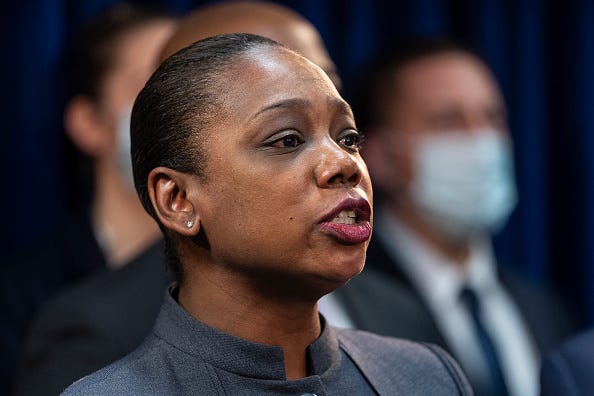
NEW YORK (WCBS 880) -- The new commissioner of the NYPD is reportedly “concerned” by a list of new policies Manhattan District Attorney Alvin Bragg introduced earlier this week that have already garnered plenty of outcry.
NYPD Commissioner Keechant Sewell made her worries known in an e-mail to her department Friday, according to the New York Post.
“I have studied these policies and I am very concerned about the implications to your safety as police officers, the safety of the public and justice for the victims,” Sewell said. “I am making my concerns known to the Manhattan District Attorney and hope to have frank and productive discussions to try and reach more common ground.”
Bragg took over as Manhattan DA at the turn of the year, and issued a memo earlier this week that his office wouldn’t prosecute some low-level crimes and would avoid issuing bail except in serious circumstances.
Bragg said he would no longer prosecute marijuana misdemeanors, fare beating and resisting arrest, unless the latter is accompanied felony charges.
The office will also not go after misdemeanor trespassing, obstruction of governmental administration and prostitution, but the latter doesn't exclude "coercive practices regularly performed by those who traffic in the sex trade."
Sewell reportedly said in her letter that some of these choices would, “invite violence against police officers and will have deleterious effects on our relationship with the communities we protect … the new charging policies of the Manhattan District Attorney effectively decriminalizes much of the conduct that New Yorkers are asking the police to address.”
The DA’s Tuesday memo goes on to say his office won’t seek a “carceral sentence” except in homicide cases, other cases involving victim deaths, violent felonies causing serious injuries, domestic violence felonies, many sex offenses, public corruption and “major economic crimes.” The DA said the rules can come with exception based on a “holistic analysis of the facts.”
Bragg said pretrial detention should be reserved for “very serious” cases, especially with the crisis on Rikers Island. Sewell referenced this recommendation specifically, according to the report.
“In addition to gun possession, I am concerned that pretrial incarceration will no longer be sought for charges such as terrorism, criminal sale of a firearm, gun-point robberies,” Sewell wrote, according to the Post. “And other serious violent felonies that put the safety of the public and the police officers who have sworn to protect and serve at great risk.”
Bragg responded to the reports of Sewell’s displeasure saying, “We share Commissioner Sewell's call for frank and productive discussions to reach common ground on our shared mission to deliver safety and justice for all and look forward to the opportunity to clear up some misunderstandings."
“This conversation, that has already started, is best done directly and not through the media,” he said.
Bragg added that “safety is paramount” in his office, adding, “if you use a gun to rob a store, or any armed robbery, you will be prosecuted for a felony. I've prosecuted cases involving assaulting law enforcement, and if you punch a police officer, you will be prosecuted for a felony.”
Other points of emphasis in the memo include that in drug cases, if there’s a “reasonable view” that the accused dealer is a “low-level agent of a seller,” they’ll typically be charged with misdemeanor possession.
In robbery cases, Bragg said incidents in commercial settings should be charged as petit larceny “if the force or threat of force consists of displaying a dangerous instrument or similar behavior but does not create a genuine risk of physical harm.”
“A gun-point robbery is a gun-point robbery — it should be immaterial to a victim that it happened in a commercial establishment as opposed to on the street, and the assailant should face the full consequences of the law,” Sewell reportedly wrote.
The office will also look to invest more into “diversion” programs as an incarceration alternative.
The moves caused immediate outcry from groups like the New York City Police Benevolent Association, with President Patrick Lynch saying they had "serious concerns" about Bragg's memo.
"Police officers don’t want to be sent out to enforce laws that the district attorneys won’t prosecute," said Lynch. "And there are already too many people who believe that they can commit crimes, resist arrest, interfere with police officers and face zero consequences."




